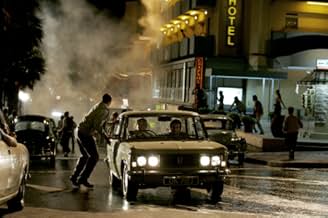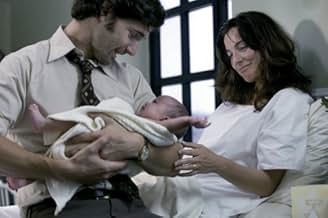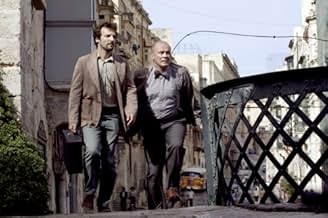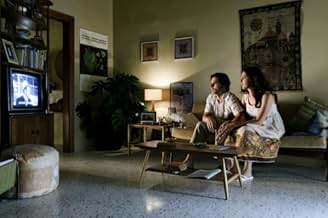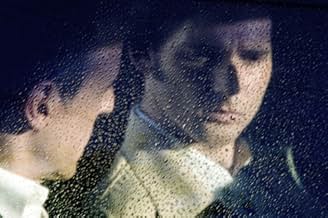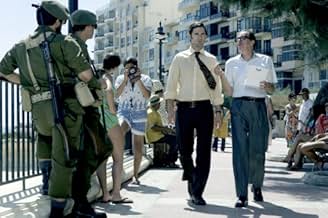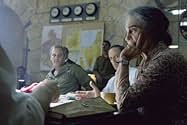Auf Grundlage der wahren Geschichte der Folgen des Schwarzen Septembers erzählt der Film von den fünf Männern, die ausgewählt wurden, diejenigen zu eliminieren, die für diesen Schicksalstag ... Alles lesenAuf Grundlage der wahren Geschichte der Folgen des Schwarzen Septembers erzählt der Film von den fünf Männern, die ausgewählt wurden, diejenigen zu eliminieren, die für diesen Schicksalstag verantwortlich waren.Auf Grundlage der wahren Geschichte der Folgen des Schwarzen Septembers erzählt der Film von den fünf Männern, die ausgewählt wurden, diejenigen zu eliminieren, die für diesen Schicksalstag verantwortlich waren.
- Regie
- Drehbuch
- Hauptbesetzung
- Für 5 Oscars nominiert
- 14 Gewinne & 75 Nominierungen insgesamt
Marie-Josée Croze
- Jeanette the Dutch Assassin
- (as Marie-Josee Croze)
Valeria Bruni Tedeschi
- Sylvie
- (as Valéria Bruni Tedeschi)
Amos Lavi
- General Yariv
- (as Amos Lavie)
Empfohlene Bewertungen
'Munich' is, on the whole, a straight forward hit-man movie. The assignments are handed out; the team is assembled, each with their own specialty; and they travel about Europe plotting and carrying out their hits. We have the inevitable paranoia, the double agents and suspicious loyalties. So far, so familiar. Only 'Munich' is wrapped in the thin veneer of 'history' and 'fact', and mob bosses and corporate espionage is replaced with Middle Eastern politics and Israeli-Arab relations. I mention this because the politics of 'Munich' are really nothing more than a topical plot devise, used the same way as cold-war relations and soviet villainy was used thirty years ago.
What prevents 'Munich' becoming just a generic updated-cold-war thriller, is the sheer quality of the production. From the flawless recreation of European capitals in the early seventies to the impeccable costume design to the beautiful cinematography 'Munich' is a visually fascinating movie. The performances are universally outstanding, with Bana in particular bringing a sense of tough nobility that seems to be his forte. The script is intelligent and thought-provoking, and it is Kushner's focus on the emotional and psychological landscape of his characters rather than the details of political contract killing, that ultimately lifts the movie above the generic. The kind of self-consciously poetic prose for which he is known, so often seeming unrealistically erudite, is kept to a minimum, and when it does appear, is so beautifully written and performed that all reservations are forgotten.
Ultimately, the greatest praise must be reserved for Spielberg, who has, with 'Munich', created perhaps the first truly adult movie of his career. We see no signs of his trademark sentimentality, his descents into fantasy, his childish simplification of motivation. With 'Munich', he embraces ambiguity and complexity, and as a result, has invited criticism from those who prefer their drama simplistically black and white. Above all, one can't help but wonder what the Spielberg oeuvre would look had he not dedicated his career to kid's movies, fantasies and feel-good sci-fi.
'Munich' is an intelligent and gripping thriller that is a major contender for award recognition, and deservedly so. An outstanding achievement.
What prevents 'Munich' becoming just a generic updated-cold-war thriller, is the sheer quality of the production. From the flawless recreation of European capitals in the early seventies to the impeccable costume design to the beautiful cinematography 'Munich' is a visually fascinating movie. The performances are universally outstanding, with Bana in particular bringing a sense of tough nobility that seems to be his forte. The script is intelligent and thought-provoking, and it is Kushner's focus on the emotional and psychological landscape of his characters rather than the details of political contract killing, that ultimately lifts the movie above the generic. The kind of self-consciously poetic prose for which he is known, so often seeming unrealistically erudite, is kept to a minimum, and when it does appear, is so beautifully written and performed that all reservations are forgotten.
Ultimately, the greatest praise must be reserved for Spielberg, who has, with 'Munich', created perhaps the first truly adult movie of his career. We see no signs of his trademark sentimentality, his descents into fantasy, his childish simplification of motivation. With 'Munich', he embraces ambiguity and complexity, and as a result, has invited criticism from those who prefer their drama simplistically black and white. Above all, one can't help but wonder what the Spielberg oeuvre would look had he not dedicated his career to kid's movies, fantasies and feel-good sci-fi.
'Munich' is an intelligent and gripping thriller that is a major contender for award recognition, and deservedly so. An outstanding achievement.
This movie relates more than just a story of "Vengeance". Besides proving that killing begets killing - it consists of numerous fine details that reveal the hard work done at getting to the depth of things:
For instance, only characters that get shot in the head slump to the ground. The rest take time to die - they walk a few steps, spurt blood and express a look of helplessness and inevitability before going out. Yes its horrifying to look at, which is the point, but it is also real.
Every character is different, and though common in their desire for vengeance, their temperaments are clearly distinguishable in the way the hit men approach their task. Even the terrorists are not stereotyped into hysterical, screaming lunatics. They range from the visibly nervous to the cool Abu Salameh with the movie star style. They are poets, intellectuals and guerrillas each with his story of the conflict. They speak passionately about home - a recurring theme, along with "family". Moreover, Spielberg does not attempt to mitigate the grotesque manner of their deaths, for the blood of the targeted men flows as freely as that of their victims - and when they are blown up, their body parts dangle from ceiling fans. You are not here to feel satisfaction over anyone's death, Spielberg says to the audience. Or as Caine would say in Kung Fu: "The taking of a life does no one honour."
There are no easy "shoot-em-dead" eliminations. There are neighbors, bystanders and obstacles that must be avoided and protected - with variable success. Innocent people may be harmed - and one has to live with that.
There are no mathematical certainties about the potential damage a bomb will cause.
Perspectives and convictions can change, sometimes regrettably. "Don't think about it - just do it" says Avner at one stage when a member of the team expresses doubts about a target's guilt. But at the end he wants evidence that the men he despatched were justifiably killed. Implausible? No; it is only when he has been reunited with his family and experiences the affection of wife and child that he allows himself to reflect from a different perspective - their targets had families too - what if he had killed the wrong men?
The paranoia that permeates the world of spies and assassins is built up gradually - to the point where every survivor mistrusts everybody else. One is doomed all one's life to walk with ears strained for following footsteps. The length of the movie creates the right atmosphere for this idea.
The end dissatisfies many because they would like a reassurance, a note of optimistic finality - but Spielberg rightly offers none. It would be dishonest of him to offer a false but comforting illusion.
It is interesting to contrast this movie with "Paradise Now" that has no violence, a modest budget, and views the conflict from the Palestinian camp. Both narrate completely different stories - yet, in their respective ways, both humanize their subjects, defuse myths about glory, and arrive at the same conclusion: "There's no peace at the end of this."
For instance, only characters that get shot in the head slump to the ground. The rest take time to die - they walk a few steps, spurt blood and express a look of helplessness and inevitability before going out. Yes its horrifying to look at, which is the point, but it is also real.
Every character is different, and though common in their desire for vengeance, their temperaments are clearly distinguishable in the way the hit men approach their task. Even the terrorists are not stereotyped into hysterical, screaming lunatics. They range from the visibly nervous to the cool Abu Salameh with the movie star style. They are poets, intellectuals and guerrillas each with his story of the conflict. They speak passionately about home - a recurring theme, along with "family". Moreover, Spielberg does not attempt to mitigate the grotesque manner of their deaths, for the blood of the targeted men flows as freely as that of their victims - and when they are blown up, their body parts dangle from ceiling fans. You are not here to feel satisfaction over anyone's death, Spielberg says to the audience. Or as Caine would say in Kung Fu: "The taking of a life does no one honour."
There are no easy "shoot-em-dead" eliminations. There are neighbors, bystanders and obstacles that must be avoided and protected - with variable success. Innocent people may be harmed - and one has to live with that.
There are no mathematical certainties about the potential damage a bomb will cause.
Perspectives and convictions can change, sometimes regrettably. "Don't think about it - just do it" says Avner at one stage when a member of the team expresses doubts about a target's guilt. But at the end he wants evidence that the men he despatched were justifiably killed. Implausible? No; it is only when he has been reunited with his family and experiences the affection of wife and child that he allows himself to reflect from a different perspective - their targets had families too - what if he had killed the wrong men?
The paranoia that permeates the world of spies and assassins is built up gradually - to the point where every survivor mistrusts everybody else. One is doomed all one's life to walk with ears strained for following footsteps. The length of the movie creates the right atmosphere for this idea.
The end dissatisfies many because they would like a reassurance, a note of optimistic finality - but Spielberg rightly offers none. It would be dishonest of him to offer a false but comforting illusion.
It is interesting to contrast this movie with "Paradise Now" that has no violence, a modest budget, and views the conflict from the Palestinian camp. Both narrate completely different stories - yet, in their respective ways, both humanize their subjects, defuse myths about glory, and arrive at the same conclusion: "There's no peace at the end of this."
Munich may just be Spielberg's greatest accomplishment ever and it isn't a sweeping epic like you'd expect, but a patient psychological thriller that sneaks up on you and takes you and shakes you. It not shy away from blood, politics or nudity in its portrayal of events and this makes it extremely intense, absorbing and occasionally very violent.
The first half of Münich is not altogether different from a heist drama; a group of diverse men with different skills team up to accomplish a mission. They get to travel across Europe, make deals, infiltrate suspect facilities and manufacture explosive devices. Unlike heist films, however, their mission is not for personal gain, but for the government. They are to assassinate eleven Arabs who were alleged to be behind terrorist attacks like Münich 1972. So the more accessible part of the film sees Bana and his men botch their way through a hit-list as inexperienced hit-men, fumbling and trembling with the weight of this somber new task.
This part is so extraordinarily well-handled and engaging with a tone so tense and shadowed by politics and ethical dilemmas that every slight pause is mistaken for humour. It is also an excellent portrayal of an era - the 1970s - with great eye for detail, all carefully sewn together by a master tailor (Spielberg). It is a fantastic piece of film-making.
While Munich keeps you interested throughout, it gradually loses its fresh thriller edge by opting for more typical scenarios. Eric Bana's character goes through emotional struggles because he finds it too hard to kill people. He thinks about his family--his wife has just had a baby girl. He wonders if he is doing the right thing. He starts sympathizing with the Arabs. He wonders if they killings will stop once he has completed his mission. Everything is classic and you saw it coming. It needs to be present in the film for a balanced portrayal but the hackneyed formula with which it is expressed is disappointing. It started so promising, after all.
Sadly, the culmination of this slightly hackneyed recipe manifests itself in the final scene of the film and it is absolutely dreadful and drags the whole film down by at least one star - but overall this is superb quality that is carried by a strong ensemble cast (Geoffrey Rush, Daniel Craig) although it is ultimately Bana's show. He captures the inner turmoil and hesitation of his character in the most believable way, making Munich into a worthwhile adventure for its performances alone. But most importantly, it dares to asks questions.
8/10
The first half of Münich is not altogether different from a heist drama; a group of diverse men with different skills team up to accomplish a mission. They get to travel across Europe, make deals, infiltrate suspect facilities and manufacture explosive devices. Unlike heist films, however, their mission is not for personal gain, but for the government. They are to assassinate eleven Arabs who were alleged to be behind terrorist attacks like Münich 1972. So the more accessible part of the film sees Bana and his men botch their way through a hit-list as inexperienced hit-men, fumbling and trembling with the weight of this somber new task.
This part is so extraordinarily well-handled and engaging with a tone so tense and shadowed by politics and ethical dilemmas that every slight pause is mistaken for humour. It is also an excellent portrayal of an era - the 1970s - with great eye for detail, all carefully sewn together by a master tailor (Spielberg). It is a fantastic piece of film-making.
While Munich keeps you interested throughout, it gradually loses its fresh thriller edge by opting for more typical scenarios. Eric Bana's character goes through emotional struggles because he finds it too hard to kill people. He thinks about his family--his wife has just had a baby girl. He wonders if he is doing the right thing. He starts sympathizing with the Arabs. He wonders if they killings will stop once he has completed his mission. Everything is classic and you saw it coming. It needs to be present in the film for a balanced portrayal but the hackneyed formula with which it is expressed is disappointing. It started so promising, after all.
Sadly, the culmination of this slightly hackneyed recipe manifests itself in the final scene of the film and it is absolutely dreadful and drags the whole film down by at least one star - but overall this is superb quality that is carried by a strong ensemble cast (Geoffrey Rush, Daniel Craig) although it is ultimately Bana's show. He captures the inner turmoil and hesitation of his character in the most believable way, making Munich into a worthwhile adventure for its performances alone. But most importantly, it dares to asks questions.
8/10
Just because this film has been attacked by pols and shills, here's my 2 cents. Spielberg manages to set the agenda, and sets it correctly. It is indeed about the antecedents to 9/11, and bravo to Spielberg for taking it on, but not somewhere in Afghanistan, but at its genesis, the squalor of Palestine.
Spielberg's film is an essay on revenge and how hopeless and self-defeating that ancient temptation is. It's brave of Spielberg to say it to us now; brave, too, to paint the avenging Israelis as somewhere below the Angels. Let's be candid: There are harsh sentiments expressed here, by some Israeli characters, that the Evangelical Lobby simply doesn't want aired.
Spielberg's handling of the Bana character is masterful. Noteworthy is how uncompromising it is: this is a man whose identity has collapsed. It's entirely right that his Israeli handler should refuse the Sabbath-meal invitation at the end, realizing that the bonds of the older religion (and pre-Zionist identity) are shattered and meaningless.
Spielberg might have improved this product (some of the dialogues are horribly wooden). But that's not important. That a mainstream US film should go where this film goes is significant. This is a major-minor event in Spielberg's long and luminous career.
Spielberg's film is an essay on revenge and how hopeless and self-defeating that ancient temptation is. It's brave of Spielberg to say it to us now; brave, too, to paint the avenging Israelis as somewhere below the Angels. Let's be candid: There are harsh sentiments expressed here, by some Israeli characters, that the Evangelical Lobby simply doesn't want aired.
Spielberg's handling of the Bana character is masterful. Noteworthy is how uncompromising it is: this is a man whose identity has collapsed. It's entirely right that his Israeli handler should refuse the Sabbath-meal invitation at the end, realizing that the bonds of the older religion (and pre-Zionist identity) are shattered and meaningless.
Spielberg might have improved this product (some of the dialogues are horribly wooden). But that's not important. That a mainstream US film should go where this film goes is significant. This is a major-minor event in Spielberg's long and luminous career.
7e-20
Munich is a well crafted film by the biggest director on the planet. Great pacing, suspense and cinematography. The biggest problem I had with the film is that I've seen it before. A little known film called THE SWORD OF GIDEON. Munich is almost a direct copy from the original. What a shame that Spielberg has to produce a remake of a much better film. Enough already with the remakes. People want to see original stories with fresh new ideas and writers. Why are independent films so successful, because the ones that are well made and tell a good story are box office darlings. It's amazing some Hollywood films have budgets north of 100 million. Just incredible how much money and time is wasted. If you want to understand what happened in the aftermath of Munich, rent THE SWORD OF GIDDEON.
Wusstest du schon
- WissenswertesGuri Weinberg played his own father. He is the son of Moshe Weinberg, the Israeli wrestling referee and former champion, who died in the massacre when Guri was just one month old.
- PatzerThough they took the time to digitally add the World Trade Center to the final shot, they didn't edit out the Citigroup Center, Trump World Tower, and the Bloomberg building, which were built after the time of the movie.
- Alternative VersionenThe film was heavily censored in Malaysia for a 'U' rating. The uncut version is rated '18PL'.
- VerbindungenFeatured in Today: Folge vom 27. Juli 2005 (2005)
- SoundtracksAin't No Sunshine
Written & Performed by Bill Withers
Courtesy of Columbia Reecords
By Arrangement with Sony BMG Music Entertainment
Top-Auswahl
Melde dich zum Bewerten an und greife auf die Watchlist für personalisierte Empfehlungen zu.
Details
- Erscheinungsdatum
- Herkunftsländer
- Sprachen
- Auch bekannt als
- Munich
- Drehorte
- Bugibba, Malta(Olympic Hotel in Cyprus)
- Produktionsfirmen
- Weitere beteiligte Unternehmen bei IMDbPro anzeigen
Box Office
- Budget
- 70.000.000 $ (geschätzt)
- Bruttoertrag in den USA und Kanada
- 47.403.685 $
- Eröffnungswochenende in den USA und in Kanada
- 4.152.260 $
- 25. Dez. 2005
- Weltweiter Bruttoertrag
- 130.982.407 $
- Laufzeit2 Stunden 44 Minuten
- Farbe
- Sound-Mix
- Seitenverhältnis
- 2.35 : 1
Zu dieser Seite beitragen
Bearbeitung vorschlagen oder fehlenden Inhalt hinzufügen


